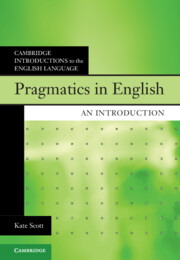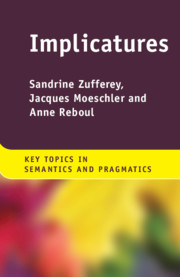16 results
Learning psychology from riddles: The case of stumpers
-
- Journal:
- Judgment and Decision Making / Volume 13 / Issue 1 / January 2018
- Published online by Cambridge University Press:
- 01 January 2023, pp. 112-122
-
- Article
-
- You have access
- Open access
- HTML
- Export citation

Pragmatics in English
- An Introduction
-
- Published online:
- 29 December 2022
- Print publication:
- 29 December 2022
-
- Textbook
- Export citation
Chapter 4 - Gricean Pragmatics
-
- Book:
- Pragmatics in English
- Published online:
- 29 December 2022
- Print publication:
- 29 December 2022, pp 64-87
-
- Chapter
- Export citation
1 - Post-Gricean Pragmatics for Intercultural Communication
- from Part I - Theoretical Foundation
-
-
- Book:
- The Cambridge Handbook of Intercultural Pragmatics
- Published online:
- 29 September 2022
- Print publication:
- 20 October 2022, pp 11-39
-
- Chapter
- Export citation
15 - Implicatures
- from Part VIII - Implying and (Pre)supposing
-
-
- Book:
- Linguistics Meets Philosophy
- Published online:
- 06 October 2022
- Print publication:
- 13 October 2022, pp 441-469
-
- Chapter
- Export citation
5 - Semantic Communication in Primates
- from Part I - Communication and Language
-
-
- Book:
- The Cambridge Handbook of Animal Cognition
- Published online:
- 01 July 2021
- Print publication:
- 22 July 2021, pp 100-114
-
- Chapter
- Export citation
1 - Classic Speech Act TheoreticApproaches
-
- Book:
- Indirect Speech Acts
- Published online:
- 21 May 2021
- Print publication:
- 10 June 2021, pp 5-42
-
- Chapter
- Export citation
8 - Plausible Deniability
- from Part II - Performance and Falsehood
-
-
- Book:
- Language in the Trump Era
- Published online:
- 18 September 2020
- Print publication:
- 03 September 2020, pp 137-148
-
- Chapter
- Export citation
Confusion is corruptive belief in false identity
-
- Journal:
- Canadian Journal of Philosophy / Volume 46 / Issue 2 / April 2016
- Published online by Cambridge University Press:
- 01 January 2020, pp. 204-227
-
- Article
- Export citation
Personal Notes on a Shared Trajectory
- from Reflections on the Development of Relevance Theory
-
-
- Book:
- Relevance, Pragmatics and Interpretation
- Published online:
- 08 July 2019
- Print publication:
- 18 July 2019, pp 13-20
-
- Chapter
- Export citation
Reflections on the Development of Relevance Theory
-
- Book:
- Relevance, Pragmatics and Interpretation
- Published online:
- 08 July 2019
- Print publication:
- 18 July 2019, pp 11-12
-
- Chapter
- Export citation
1 - Ordinary Language Philosophy and the Birth of Pragmatics
- from Part I - Theoretical Foundations
-
- Book:
- Implicatures
- Published online:
- 10 June 2019
- Print publication:
- 13 June 2019, pp 3-21
-
- Chapter
- Export citation
Part I - Theoretical Foundations
-
- Book:
- Implicatures
- Published online:
- 10 June 2019
- Print publication:
- 13 June 2019, pp 1-66
-
- Chapter
- Export citation
Part II - Types of Implicature
-
- Book:
- Implicatures
- Published online:
- 10 June 2019
- Print publication:
- 13 June 2019, pp 67-140
-
- Chapter
- Export citation
4 - Particularized Conversational Implicatures
- from Part II - Types of Implicature
-
- Book:
- Implicatures
- Published online:
- 10 June 2019
- Print publication:
- 13 June 2019, pp 69-87
-
- Chapter
- Export citation

Implicatures
-
- Published online:
- 10 June 2019
- Print publication:
- 13 June 2019

